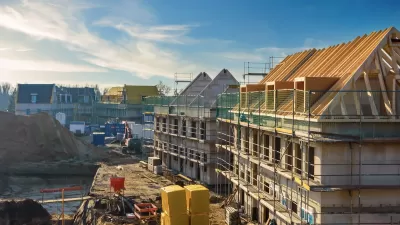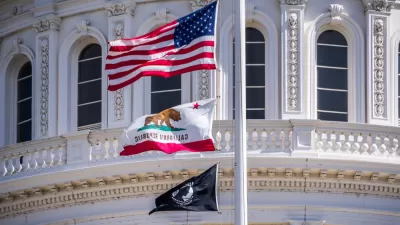Developers, public officials and others complain about the California Environmental Quality Act (CEQA). But the law doesn't change because everyone—even developers and public agencies—has something to gain from the leverage it offers.
Bill Fulton says lots of people complain about CEQA but it keeps not changing for a reason: almost everyone has something to gain from the way it is now. In his monthly "Insight" commentary for the California Planning & Development Report, he writes: "Environmental and citizen groups have always used CEQA to gain leverage, of course – that’s the point of the law. But today, unions, business trade associations, rival local government agencies, and even the building industry all use CEQA to gain leverage over some local political process, and in most cases there’s no other way for them to get so much leverage."
FULL STORY: Insight: Everyone wants to keep leverage under CEQA

Planetizen Federal Action Tracker
A weekly monitor of how Trump’s orders and actions are impacting planners and planning in America.

Maui's Vacation Rental Debate Turns Ugly
Verbal attacks, misinformation campaigns and fistfights plague a high-stakes debate to convert thousands of vacation rentals into long-term housing.

Restaurant Patios Were a Pandemic Win — Why Were They so Hard to Keep?
Social distancing requirements and changes in travel patterns prompted cities to pilot new uses for street and sidewalk space. Then it got complicated.

In California Battle of Housing vs. Environment, Housing Just Won
A new state law significantly limits the power of CEQA, an environmental review law that served as a powerful tool for blocking new development.

Boulder Eliminates Parking Minimums Citywide
Officials estimate the cost of building a single underground parking space at up to $100,000.

Orange County, Florida Adopts Largest US “Sprawl Repair” Code
The ‘Orange Code’ seeks to rectify decades of sprawl-inducing, car-oriented development.
Urban Design for Planners 1: Software Tools
This six-course series explores essential urban design concepts using open source software and equips planners with the tools they need to participate fully in the urban design process.
Planning for Universal Design
Learn the tools for implementing Universal Design in planning regulations.
Heyer Gruel & Associates PA
JM Goldson LLC
Custer County Colorado
City of Camden Redevelopment Agency
City of Astoria
Transportation Research & Education Center (TREC) at Portland State University
Jefferson Parish Government
Camden Redevelopment Agency
City of Claremont





























